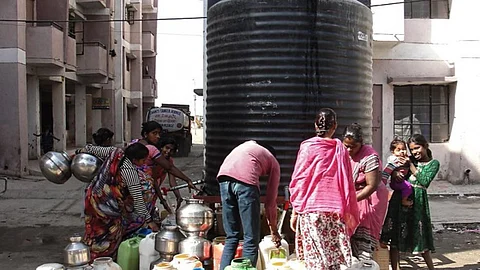
- Topics
- Feature
- Opportunities & Events
- About
- Hindi Portal
- Data
- Topics
- Feature
- Opportunities & Events
- About
- Hindi Portal
- Data

Taking note of the severe water crisis looming in the state, the Madras High Court has come down strongly on the Tamil Nadu government for not taking adequate steps to battle the crisis. The court has now sought a state-wide comprehensive report on the number of reservoirs in the state and status of desilting works. However, as per the latter, the water crisis in Chennai is not as big as being hyped by the media.
Tamil Nadu Chief Minister K Palaniswami said that drought and deficient monsoon has resulted in depletion of groundwater levels, but maintained that the issue wasn't as serious as it was being made out to be.
Amidst the ongoing crisis, the Tamil Nadu has accepted Kerala's aid of 20 lakh litres of drinking water.
A recent NITI Ayog report on groundwater levels in India says that 21 Indian cities including Delhi, Bengaluru, Chennai, and Hyderabad, will run out of groundwater by 2020, affecting nearly 100 million people.
Further, the report says that 40 percent of India's population will have no access to drinking water by 2030, making a special mention of the current water crisis in Chennai. Despite having better water resources and rains than any other metro cities, Chennai's rivers, water bodies and wetlands are mostly dry. However, former National Water Academy director, Professor Manohar Khushalani has suggested that rainwater harvesting can tackle such a crisis at an individual level.
In the wake of the looming water crisis, the Madhya Pradesh government is planning to implement a Right to Water Act. As per the guidelines of the act, 55 litres of water per day will be provided to each individual in the state. The act will also have stringent provisions for preventing wastage of water. If implemented, Madhya Pradesh will be the first state in the country to enact a Right to Water legislation.
To tackle Punjab's falling water table, the Soil and Water Conservation Department launched a project some years ago to utilise treated water from Sewage Treatment Plants (STPs) for irrigation. The project is slowly becoming popular among farmers in the state due to its low operational and maintenance cost and due to the fact that it's less dependent on groundwater. Under the scheme, the department sets up irrigation infrastructure from STPs by laying underground pipelines in fields, which are then handed over to Water User Associations to operate. As yet, the scheme is providing treated water to irrigate nearly 18,000 acres of farmlands and plans to create more irrigation facilities for over 1.25 lakh acres in the coming years.
The Telangana chief minister K Chandrasekhar Rao has inaugurated the Kaleshwaram multi-purpose lift irrigation project being built on the Godavari river. Maharashtra Chief Minister Devendra Fadnavis and Andhra Pradesh Chief Minister YS Jagan Mohan Reddy were invited to the ceremony as they had extended their cooperation to the Kaleshwaram project.
The estimated cost for this project is set to cross one lakh crore rupees, and involves the construction of three barrages – Medigadda, Annaram and Sundilla – where water from the Godavari would be reverse-pumped from one barrage to another and diverted into a complex system of reservoirs, water tunnels, pipelines and canals.
This is a roundup of important policy matters from June 19 - 25, 2019. Also, read news this week.